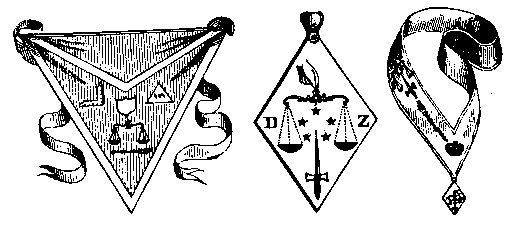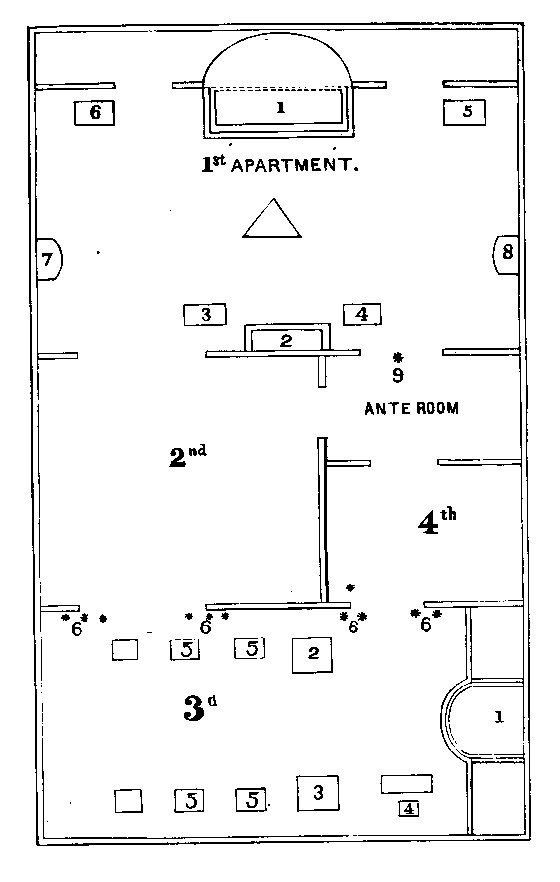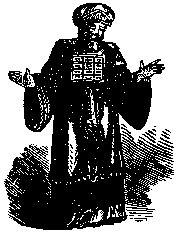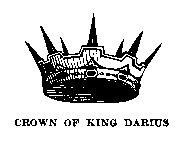The Web of Hiram |
Degrees of the Ancient and Accepted Scottish Rite14. Grand Elect, Perfect and Sublime Master Mason 15. Knight of the East or Sword 17. Knights of the East and West 18. Knight of the Rose-Croix de Heredom 20. Grand Master of all Symbolic Lodges 21. Noachite or Prussian Knight 25. Knight of the Brazen Serpent 29. Knight of St Andrew, or Patriarch of the Crusades |
PRINCE OF JERUSALEMThe Sixteenth Degree of the Ancient and Accepted Scottish Rite, and the Second Degree of the Historical Series
ARGUMENTThe Sixteenth Degree, or Prince of Jerusalem, being a continuation of the fifteenth grade, represents historically the troubles and trials of the ancient Masons, in their endavours to rebuild the Temple; their obtaining permission, and their final success, under the authority and will of Darius the successor of King Cyrus, in the completion of that noble edifice, in the sixth year of his reign, - which Temple was like unto, if not more magnificent than, the first, built by the great King Solomon. This Temple covered the same ground as the one destroyed by Nebuzaradan, and was furnished with the same precious vessels returned by King Darius from Babylon to the Jews. The grade of Prince was conferred by King Darius and ratified and confirmed by the Knight Masons at Jerusalem, as a Masonic acknowledgment to Zerubbabel and his companions for their preservation, and frank averment of Masonic virtues, despite the highest honours tendered by the king. Formerly, Princes of Jerusalem were entitled to many privileges and prerogatives by virtue of their rank. They had exclusive control over Sublime Freemasonry, from, the 4th to the 15th Degree inclusive. Grand Councils of this Grade granted Charters to Lodges of Perfection, and also governed and controlled the symbolic grades of the Scotch Rite, in all countries where no regular Grand Lodge was established. According to the G. Constitutions of 1786, Art. 6, it was provided, 11 That the power of the Supreme Council shall not interfere with any grade under the 17th, or K. of the E. and W. This power is now exercised by the Supreme Council. APARTMENTSThe apartments are four in number: The first represents the Council of the Knights of the East or Sword, when at their labours endeavoring to rebuild the Temple -the furniture being in disorder, the altars overturned, and pieces of masonry lying in confusion in different parts of the room. The platform of the East is concealed by a drop-curtain, the Master presiding at the front of the same. The second apartment represents the road from Jerusalem to Babylon, and by scenic effects should indicate the open country. The third apartment is the throne-room of King Darius of Persia. The furniture should be of the most magnificent Oriental kind, draped with green hangings, with golden furniture and aurora-colored trimmings. No Masonic emblems or devices should be seen. The fourth apartment is the banquet-hall of Darius and should be in keeping with the throne-room OFFICERS-FIRST APARTMENT1. Most Equitable Sovereign Prince Grand Master, represents Zerubbabel, son of Shealtiel. 2. Grand High Priest Deputy Grand Master, represents Joshua, son of Jozadak. 3. Most Enlightened Senior Grand Warden, represents Seraiah, Prince of Judah. 4. Most Enlightened Junior Grand Warden, represents Mordecai, Prince of Benjamin. .5. Valiant Keeper of Seals, represents Esdras, Prince of the Law. 6. Valiant Grand Treasurer, represents Ananias, Prince of the Temple. 1. Grand Master of Ceremonies, represents Solamiel, Prince of Workmen. 8. Grand Master of Entrances, represents Nehemiah, Prince of the Guards. 9. Grand Tyler. JEWELSAll of which are enclosed in squares. 1st Office - A hand of justice and a mallet, designating Just Ruler. 2d Officer - Circle, surrounding a Delta, designating Eternity of Deity. 3d. Officer - Small pillar of strength and shield, designating the Lion of Judah. 4th Officer - Compass on a segment of a circle, design Measure of Peace. 5th Officer - Balance in equipoise, designating Justice. 6th Officer - Parallelogram with vase, designating The Unbounded Treasure for the Temple 7th Officer-Trowel and plum, designating conductor of the Works. 8th Officer-Spear, designating Guardian of Secrecy. 9th Officer-Flaming sword, designating Vengeance
COSTUMESThe costumes of all the officers, except that of the Grand High Priest, at a reception, are those of Knights of the East or Sword i. e. black robes with hoods, water-green coloured sashes, with rosettes, swords, belts, and trowels. The apron of the fourteenth grade may properly be worn.
The costume of the Grand High Priest consists of a figured tunic of white linen reaching to the feet, over which is worn a purple robe about fifteen inches shorter, upon the border of which are suspended seventy-two small bells, and as many pomegranates, alternating. An ephod is also worn, without sleeves, which extends to the hips, and is gathered in at the waist by a ribbon. A breastplate is also suspended from the neck, nine inches square, containing twelve precious stones, representing the twelve sons of Jacob and upon it were also the Urim and Thummim the first of which words is generally rendered "light," and the other "truth, or perfection." Attached to the ephod, and upon each shoulder, is a precious stone. On the one on the right shoulder are the names of the six eldest of the children of Israel, and on the one on the left the names of the six youngest. On the head of the High Priest is a purple or blue linen tiara, to the front of which is attached, by a purple or blue ribbon, a plate of gold, containing the words, "Holy to the Lord," in Hebrew. Sandals should be worn on the feet. Lights Seventy in number, representing so many years of trials. Battery -* **** Apron-Crimson, edged with gold, lined with aurora colour. The flap is aurora-colour. Painted or embroidered on the area of the apron are a square, a shield, a Delta, hand of justice, a pair of balances in equipoise, and a sometimes a representation of the Temple. Order - A wide aurora-coloured ribbon edged with gold, worn from right shoulder to left hip. Sometimes embroidered in front are, a balance, a hand of justice, a poniard, five stars, and two crowns. Jewel-A lozenge-shaped mother-of-pearl. Encrusted on it in gold is a hand holding a balance in equipoise: under it a two-edged sword, hilt down, with five stars surrounding the point, the centre one larger than the others, and the letters D and Z in Hebrew, one on the left and the other on the right of the balance. OFFICERS-THIRD APARTMENT1. Darius, King of Persia, son of Hystaspes. 2. The Satrap of Media, father-in-law of the king 3. The Satrap of Assyria. 4. Artaban, Scribe. Counsellors, Courtiers, Knights, Guards, etc. COSTUMESDarius Long white robe, trimmed richly with purple, and aurichalcan (metallic trimming of gold and copper mixed, esteemed the most precious of metals) over which a long white flowing robe, hanging from the shoulders, and a crown, surmounted with seven spikes, representing the seven conspirators- the front, or seventh spike, taller than the other six. The Order of the King, a horse, neighing, rampant. Over all, a sash of a Prince, which is transferred to the person of Zerabbabel, when created a Prince of Jerusalem.
[Darius conspired, with six other nobles, to destroy Smerdis, who usurped, the crown of Persia, after the death of Cambyses. Darius obtained the crown by a species of cunning.] The Satraps Counsellors, Knights, etc., appropriately costumed. RECEPTIONZer.: O King, the Masonic people whom I have the honour to govern, wishing to testify to you their joy at the advancement of your august majesty to the throne, have deputed me, with these illustrious Knights, my companions, to tender to you their congratulations on your ascension to the throne of all the East. You have their sincere wishes for your health and happiness. In consequence of the kindness and benevolence with which you formerly favoured me, they have been induced to hope that, in choosing me as their representative, you would be pleased the more graciously to receive what I have to Communicate in their behalf; and I myself am happy, while paying you their tribute of respect, to have the opportunity to acquit myself also of what is due to our former friendship. Darius.: Zerabbabel your people have not misjudged. They could not have selected an agent to act for them that could possibly have been more acceptable to me than thou art. We notice with pleasure that you have not forgotten our ancient ties of affection and friendship; and Darius will not, on his part, forget those ties which were dear to him while yet in private life. Your arrival among us is very opportune, to enable you to participate in the feast we give this day to the grandees of our kingdom, and to this we invite you and your associates. Previous to which we wish you to pronounce your opinion on a certain question that shall be propounded for discussion. Satrap of Assyria, do you state the question, and the reward we have promised to him who shall answer it in the most satisfactory manner. Sat.: of A.: The King of Kings, wishing to dispense his favours with a liberal hand, has deigned to promise the second place near his august majesty, the privilege of being clothed in purple, wearing a golden baldric, and being seated on a golden throne, to him who shall be able in the most satisfactory manner to resolve the question: " What is that which holds the. most powerful sway over mortals ?" Can it be possible that a question like this can for one moment be a subject of doubt or deliberation to any one who adverts to thee, thou Son of the Sun? You have this day, composing your court, one hundred and twenty-seven potentates of the most distant nations. Peace and war are in your hands. The life and death of your subjects depend upon your will. A word from your lips is a decree to all the earth. All we possess belongs to thee. Our very persons are yours. The universal world has no master but you. There cannot be a more puissant, than Darius, King of all the East-Sovereign of Sovereigns. Therefore I say, The King Darius." Sat.: of M.: What remains for me to say, O King? Shall I dare to differ in opinion from the Satrap of Assyria, who has received the plaudits of your whole, court? He contends there is nothing greater than yourself. O King! I acknowledge your greatness--the eclat of your name, the splendour of your throne, the magnitude of your power, and the grandeur of your riches. But greater than all this is the empire of Beauty! This softens the heart of the most ferocious, gains over judges the most severe, and triumphs over masters the most imperious. Deprived of fortune, it needs it not. If devoid of worldly rank and dignity, it rises above all. All stations of life are sub subject to it. The power of the gods of the earth, though respected and feared, is as nothing in comparison with the power of Beauty. The will of sovereign rulers often depends upon its caprice. What was my daughter Apame? Without wealth or rank, before her beauty elevated her to the nuptial bed of Darius. To-day this great Prince rules over you. In her turn, she reigns over him. He wills what she desires - he does what she approves. Does she rejoice, he is pleased. Is she melancholy, he is afflicted. She is the soul that gives the impress and the bias to all his movements. From her he learns to find something more interesting than kingly greatness. She sees him at her feet, and he voluntarily submits all his imperial glory to her beauty. Therefore I say, "Beauty." Zer.: What is this, O Darius, I hear in your court? Is it. already corrupted by flattery and effeminacy? Reject! reject with indignation those sentiments of yourself that have just been uttered. Strength and power reside in kings. Beauty has its influence, but it is the mark of wisdom to acknowledge the empire of Truth. Truth is omnipotent - greater than. any transitory throne - more endurable than any frail decaying beauty. These are both of short duration but truth lives forever. The power of kings, as well as that of beauty, is subject to the revolutions of chance. Truth changes never - always pure, always simple. It is the essence of the Grand Architect of the universe. It is the tie of all treaties. It is the motive of every just action, the basis of all laws, the seal of sovereign majesty, the object of every good man's search. We love those who demonstrate it, and detest those who conceal it. Lying disguises it, and, by borrowing its appearance, furnishes the best proof and clearest avowal of its superiority. Considerations more powerful than human, O King, induce me thus to dare to speak to you in its favour in opposition to the too flattering sentiments which might have seduced you from the true path. You are yourself, great Prince, I am sure, about to confirm by your decision the empire of Truth. Darius.: Yes, Zerabbabel; come, and by receiving the reward so justly due you, cause to shine forth the triumph of truth. Receive this order. The highest reward we can bestow upon you will not be commensurate with your deserts for having saved us from this snare of corruption. We are infinitely indebted, besides the recompense offered, and in order to attach nearer to our person so precious a friend as thou art, Zerubbabel, we tender you, this moment, the office of Grand Master of our House. Zer.: Sovereign of Sovereigns, for the favours which you lavish on me, I have not words to express my heartfelt gratitude; but the will of Him who regulates the destinies of all men, does not permit me to be the master of my own destiny. I am irrevocably bound to the fortunes of my people whom I conduct; and the accomplishment of the decrees of heaven, relative to the re-edification of God's holy Temple, will not allow me to accept what you are so willing to do for me this day. DECREEDarius, King of Kings, Sovereign of Sovereigns, to Saraboyan, Grand Master of the Army, and to our other Grand Officers, and to our people beyond the river, Greeting: Zerubbabel and the Deputies of the Jews, having brought their complaints of the troubles with which you harass them, in their efforts to reconstruct their Temple and city, which Cyrus, of glorious memory, had permitted them to build, we write this letter; commanding you, as soon as you receive it, without fail to second, with all your zeal and our authority, the execution of the work. If any one dare to impeach these our commands, or in any way hinder the execution of them, we order you to crucify him, and to confiscate his property for the use of the holy Temple. As a mark of our confidence in Zerubbabel, we create him Sovereign Prince of Jerusalem, and on the Knights that accompanied him in his embassy we confer the rank and title of Princes, with such powers as he shall establish on them; and we grant him full power and authority to install Princes, and elevate to the dignity of Princes of the Cities those whom he may see fit, and deem worthy and capable. We delegate to him plenary authority, and we declare the Temple, and the workmen employed on it, to be free from all imposts from us. Thus we will and order. Done at our Castle of Ecbatam, the 20th day of the month Tebet, in the year of the world 3483, in the year of Cyrus the fifteenth, and of our reign the second. [Seal] Darius You have already been invested, illustrious Prince, with the sash adopted by the Masonic Princes, in token of their golden memory of the unbounded liberality of Darius, King of Persia, to the oppressed Jews. May its aurora-colour, with the early dawn, daily bring to your mind the beauties of lasting friendship for your fellow Princes, against whom you never can combat, and in whose favour as well as in your own, you have assumed new vows. It is suspended from the right shoulder to the left hip. The apron of this grade is triangular, and in rich keeping with the sash. The area is crimson, in token of the sufferings of the Jews from the Samaritans, when building the second Temple: the trimmings and triangular flap aurora-color, for like reasons as mentioned in describing the sash. Upon the area of the apron are wrought, in gold, a representation of the second Temple and precious vessels. The jewel is made of mother-of-pearl, in the form of a lozenge, having incrusted upon it, in gold and silver, a balance at equipoise, on either side of which is a D and a Z in Hebrew: beneath the centre of the scale, a dagger with point up ; resting on which is a star, with two smaller stars on either side thereof. The mother-of-pearl denotes purity; the scales, justice; the dagger, vengeance; the five stare, Zerabbabel and his four companions. HISTORYKnights, and Princes, I deem it unnecessary to narrate to you an extended history of this degree. Like the preceding one, the ceremony is so replete with the incidents relating to the history of the re-edification of the Temple, that little need be added. The first fourteen degrees of Ineffable Masonry have reference to the construction of the first Temple the demolition of it by Nebuzaradan, under the authority of Nebuchadnezzar and Balthasar, and the conveying to Babylon of all the precious vessels and material; also, the driving into the fastnesses of the mountains and the uncultivated country all Masons Of whatever grade. The fifteenth and sixteenth degrees have direct reference to the reconstruction of the Temple by Zerubbabel; first, by permission of Cyrus, King of Persia-as exemplified in the fifteenth degree-and then more completely by the sanction of his successor, King Darius, who (with Artaxerxes) made every effort to restore the Temple in its beauty, and to refurnish it with the precious vessels taken from the first edifice. After the sacking of Jerusalem, and the destruction of King Solomon's Temple, the Masons remained captives and exiles for seventy years, during all which period they kept faithfully their promise to rebuild the Temple of their God, by preserving some portions of the holy furniture and holding Masonic Lodges. Shortly subsequent to obtaining permission of King Cyrus to reconstruct the edifice, and while the foundation was not yet complete, Cyrus died. Great apathy and indifference, in consequence, existed among the brethren, more especially as they were the subjects of hatred by the various tribes of Samaritans and Syrians, who constantly harassed them; and they were compelled, if they continued their work at all, to labour with the sword in one, hand and the trowel in the other. In the second year of the reign of King Darius, however, the High Priest succeeded in arousing a spirit of industry, and obtaining the consent of Zerubbabel to again make application for protection and liberty to rebuild the Temple. Darius, or Darayavaste, in the Persian part of the great triangular inscription at Behestun, on the frontier of ancient Media, reigned 485 years B. C. He was 29 years old when he ascended the throne, and reigned 36 years. The friendship of Darius for Zerubbabel, in his younger days, gave opportunity for the pressure of the suit of the Jews; and by the power of truth - as exhibited in the striking incident in the ceremony - permission in its amplest form was obtained from the king, and Zernbbabel created a Prince: which honour was confirmed by the Jews, and made a Masonic grade of distinction. TRIUMPHAL CHORUSRaise the glad voices of triumph, No longer shall tyrants enslave us; Lo! he is coming to save us, Judah's lion to save. Crown him with garlands of laurel, Clothe him in raiment of honour, Welcome to Salem our Brother, Zerubbabel the brave. Huzza I warmly we welcome our brother, Zerubbabel the brave. Welcome the day of rebuilding ,The Chief of whom we honor shall lead us The prayers of the righteous shall aid us Once more is Judah free. And on the mountain so holy Our Temple shall raise to the Lord. In Zion his name be adored! To Him bend the knee. Hosanna! In Zion our God be adored; To Him bend the knee. Glory to God in the highest ! He leads us from bondage and night, He brings us to freedom and light, His name shall he adored. And on the bells of the horses Shall be written in letters of gold The Prophetical phrase as of old, "Holiness to the Lord!" Hosanna! once more we will sing as of old "Holiness to the Lord! " |
|
|
||||||||||||
|
|
[ to top ] |



